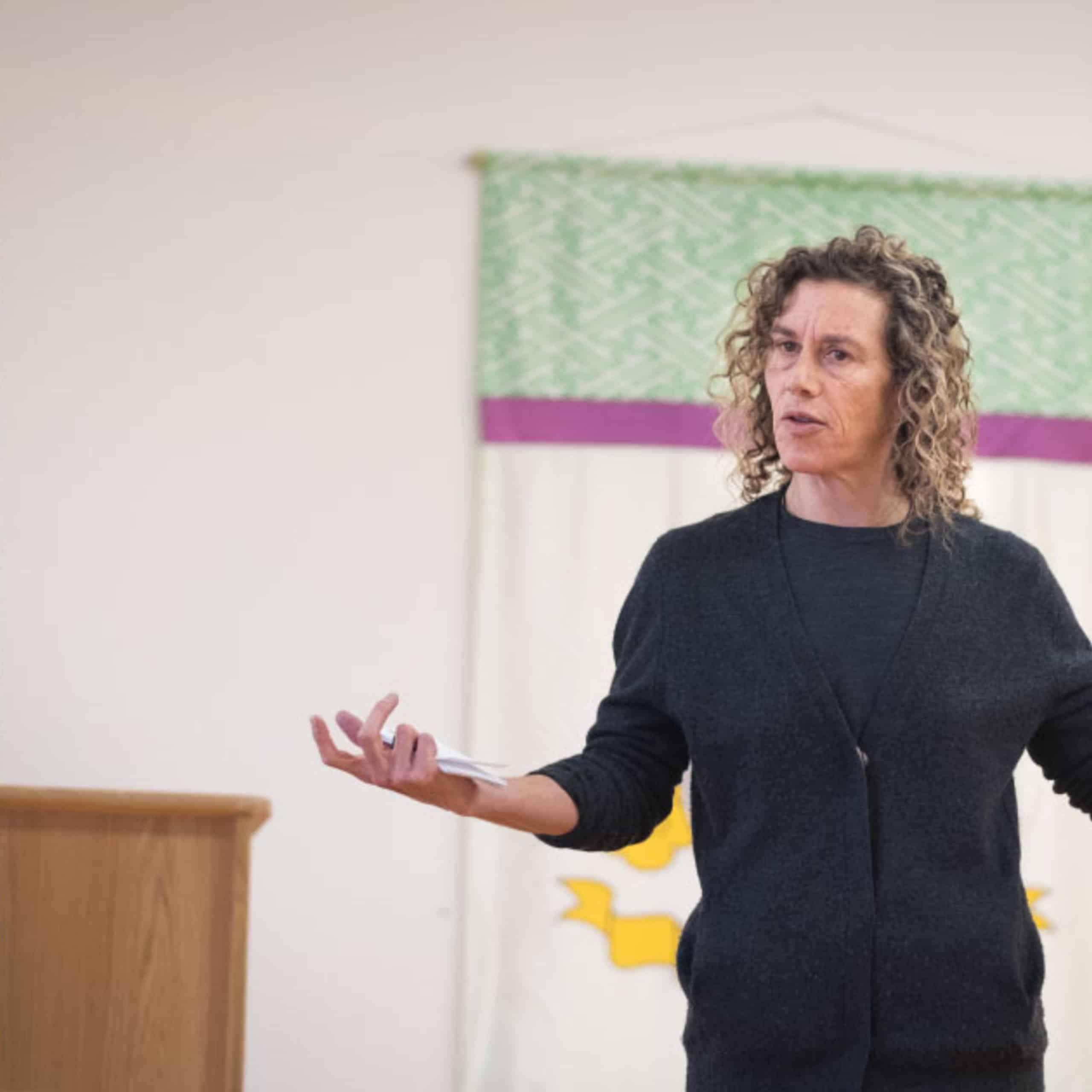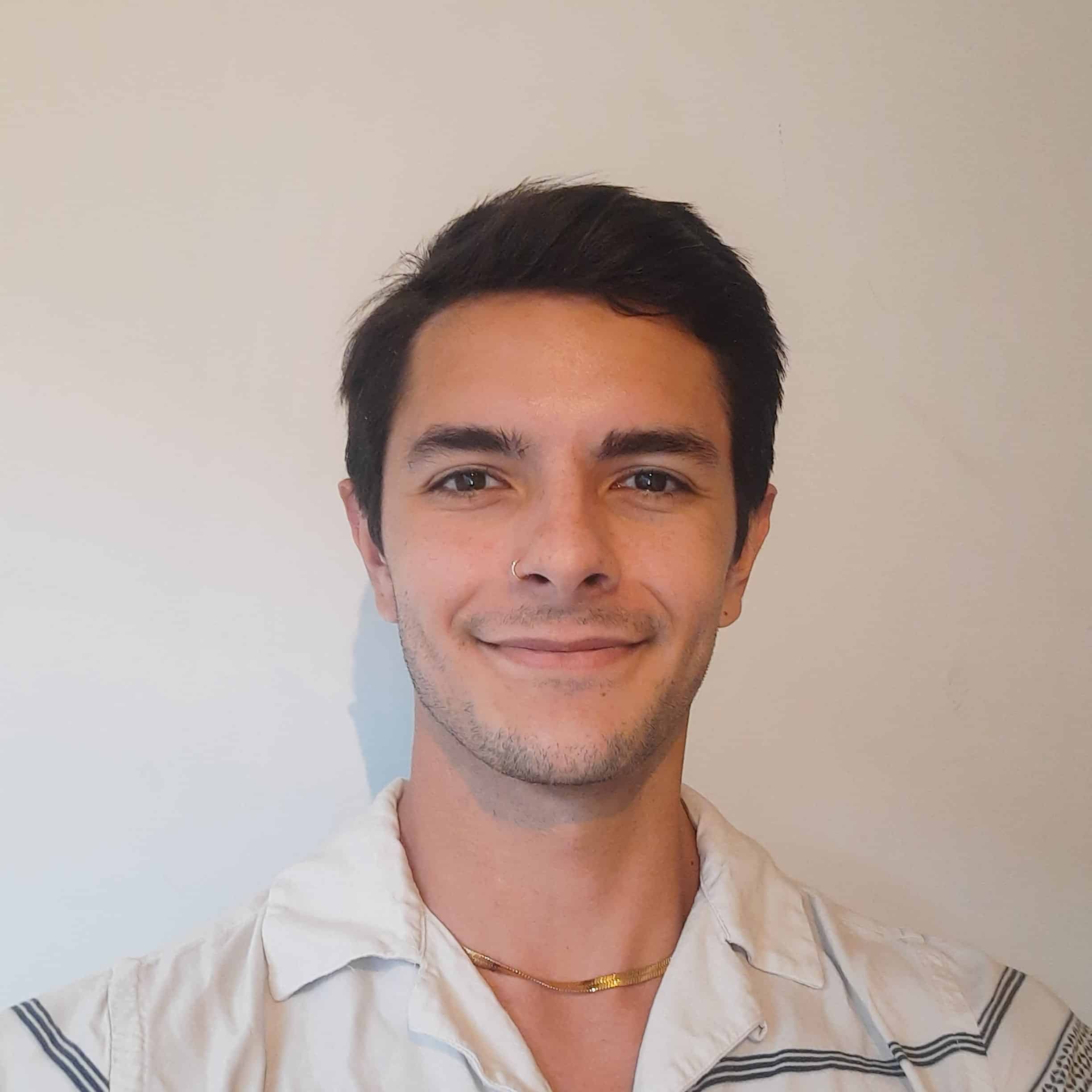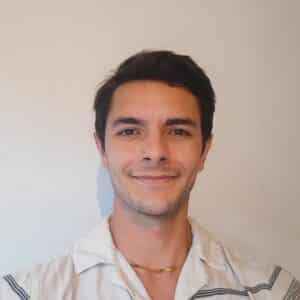Clinical Mental Health Counseling MA
Somatic Counseling Concentration
About this Concentration
Naropa’s holistic Somatic Counseling concentration combines clinical mental health theory and practice with mind-body therapy. As you explore the relationship between mind, body, and movement, you’ll learn to grow, develop, and support the wellness and sanity in yourself and your clients using powerful somatic counseling techniques.
This three-year cohort fully on-campus program is based on the belief that a functional unity exists between the mind and body and that therapeutic change occurs through direct experience of the present moment. Our graduates are prepared with theoretical, clinical, and professional skills, as well as contemplative experience, necessary to begin a compassionate, clinical practice as informed, effective psychotherapy counselors.
Community-Based Learning
Naropa’s somatic counseling degree program allows you to gain hands-on experience working in the community through practicum and internship placements. The 100-hour practicum involves a fieldwork placement. The 700-hour clinical internship incorporates meaningful service through observing and participating in the mental health community. Both experiences introduce you to different populations and help you become more comfortable with your community.
Professional Certification
Expert Faculty
Learn from licensed and certified professional counselors with a variety of clinical, teaching, and research experience working with diverse populations. Our faculty is uniquely qualified to train future somatic counselors.
Quick Facts
- 65 credit hours
- 100 practicum hours
- 700 clinical internship hours
- Professional certification
- Holistic study
- Dance/Movement Theories & Practice Concentration
- Now Accepting Applications for August 2025
Program Format
The Somatic Counseling concentration is a three-year, on-campus Clinical Mental Health Counseling Program. On top of regular theoretical coursework, students are expected to complete a 100-hour practicum at a community agency during their second year, and a 700-hour internship during the third year. These fieldwork experiences take place in a supervised environment and help students develop their counseling skills through observing and participating in the mental health community while providing meaningful service.

Course Spotlight
Specialized Approaches in Somatic Counseling
An advanced theory and skills course that studies both developmental and traumatic wounding, and the adult patterns of thought, emotion, and behavior these wounds create. Using various methodologies, students gain a somatic understanding of trauma and its physiological and psychological effects. Practical somatic techniques for contacting, accessing, deepening, processing, transforming, and integrating developmental and traumatic experiences are taught.
Degree
Requirements
The 65-credit Somatic Counseling concentration provides students with the theoretical, clinical, and professional skills to be effective counselors grounded in the integration of body, mind, and movement. Focusing on awareness practices, inclusivity, movement disciplines, creativity, counseling techniques, multicultural perspectives, and scholarly pursuits, the curriculum prepares students to be of service both to themselves and others.
Counseling Experiential Requirement:
Each student must participate in a counseling/therapy relationship with a qualified psychotherapist of their choice. A minimum of fifteen 50-minute face-to-face sessions (via telehealth or in person) within the first two years of the program is required. (The term “psychotherapist” is used to be inclusive of licensed providers from a variety of professional mental health backgrounds. The Student Guidebook outlines specific parameters of a qualified psychotherapist.)
Course Schedule
Fall Year 1 (9 credits)
- CMHC 600, Foundations of Clinical Mental Health Counseling and Orientation to the Profession (3)
- CNSS 646, Contemplative Practices for Somatic Counseling I (1)
- CMHC 601, Social/Multicultural Foundations (3)
- CNSB 627, Foundations of Somatic Counseling (2)
Spring Year 1 (11 credits)
- CMHC 603, Counseling and Helping Relationships I (3)
- CMHC 602, Human Growth and Development (3)
- CNSS 658, Applied Anatomy and Neuroscience in Counseling (2)
- CNSS 622, Body/Movement Observation/Assessment (3)
Summer Year 1 (0 credits)
Fall Year 2 (11 credits)
- CMHC 604, Counseling and Helping Relationships II (3)
- CMHC 605, Group Counseling (3)
- CMHC 606, Legal and Ethical Aspects of Counseling (3)
- CNSB 716, Specialized Approaches of Somatic Counseling (2)
Spring Year 2 (12 credits)
- CNSS 663, Family Systems (3)
- CNSS 606, Advanced Counseling Skills (3)
- CMHC 607, Diagnosis and Treatment Planning (3)
- CMHC 620, Counseling Practicum (3)
Summer Year 2 (8 credits)
- CMHC 609, Research & Program Evaluation (3)
- CMHC 608, Assessment (3)
- CMHC 621, Initial Internship (2)
Fall Year 3 (7 credits)
- CMHC 622, Internship I (3)
- CNSS 664, Crisis, Trauma, and Disaster Counseling (3)
- CMHC 615, Capstone I (1)
Winter Intersession Year 3 (0 Credits)
Spring Year 3 (7 credits)
- CMHC 624, Internship II (3)
- CMHC 610, Career Development (3)
- CMHC 616, Capstone II (1)
Total: 65 Credits
Why Choose Naropa?
Community Network
As part of your body psychotherapy training, you will complete fieldwork placements at a partnering human service agency. These opportunities will allow you to create meaningful connections with professionals and institutions in the field, setting you up for success after graduation.
Licensure Assistance
Naropa’s Credentialing Coordinator provides support to students and graduates of the Somatic Counseling program with licensure and credentialing requirements, helping them develop individualized paths toward licensure and providing assistance post-graduation.
Diversity & Inclusion
Naropa University is dedicated to embracing diversity and inclusive education. This is helpful in understanding and showing qualities that bring people together, aiming for a fair and united society.

How this Program Prepares You
Clinical Experience
During the second and third years of their degree, students will develop their clinical skills in real-world settings through field placement assignments. These crucial learning opportunities will allow students to gain experience in their specialty area of choice, be it family therapy, health and wellness services, or children’s counseling. On-site supervision, mentorship, and career development counseling complement field experience.
Holistic Somatic Awareness
Naropa’s rich and rigorous curriculum will help transform you into a deeply aware somatic psychotherapist. Our integrative psychotherapy approach emphasizes mindfulness and moving meditation, as well as diversity and community engagement. You’ll explore the current understanding of multicultural competence, as well as the historical impact on the bodies that are present in counseling, through the critical lenses of cultural identities, power, and privilege.
Diverse Skillset & Techniques
We approach somatic counseling as a systems process involving self, environment, and the interaction between both. You will learn how to use mindfulness training, breathwork, interceptive awareness, and other somatic counseling techniques to ease suffering, support mental health, and sustain change in minds, bodies, and lives. Through rigorous training and learning, you’ll be able to develop and use appropriate counseling and body psychotherapy interventions when working with clients.
Learning Outcomes
Students demonstrate the ability to research and write about Dance/Movement Theories & Practice and Somatic Counseling in a way that shows critical thinking, scholarship, and the integration of theoretical material with clinical practice.
Students demonstrate the ability to develop and use appropriate counseling and DMT/BP interventions when working with clients.
Students demonstrate the knowledge of and ability to practice the professional ethics and standards for DMTs/BPs and professional counselors, including the ability to self-regulate and self-evaluate; accept and integrate supervision; and address power and privilege both in the therapeutic relationship and within the institution.
Students internalize and manifest pluralism and multicultural competency as an integral part of clinical practice, including an ability to recognize and appreciate differences in people’s experiences of their bodies and their movement patterns.
Students develop a moment-to-moment embodiment of their experience, which includes feeling sensations, awareness of emotions, occupying the body, and tracking movements and thoughts.
Career Opportunities for Somatic Counseling
Somatic counseling training will transform you into a deeply aware therapist passionate about helping others create change in their bodies, minds, and lives., graduates are uniquely positioned to pursue career opportunities in the field right after graduation. Many develop a professional network during their field placements.
Career Opportunities for Somatic Counseling graduates include:
- Psychotherapist: use your somatic counseling skills to support individuals, groups, or organizations.
- Family Therapist: help families cultivate healing with a holistic approach.
- Social-Emotional Wellness Coordinator: develop strategies to foster a community’s well-being.
- Instructor: use your knowledge, skills, and experience to train others in somatic practices.
- Program Coordinator: develop and organize courses and programs about body psychotherapy training.
Discover Career Pathways for Somatic Counseling
Hear from a Graduate
FAQS about the
Somatic Counseling
What is somatic counseling?
‘Soma’ refers to the body imbued with Psyche. While the body may be thought of as a physical mechanism (as it often is in Western medicine), a somatic lens is one concerned with the autonomous lived experience of the body. The core of somatic counseling is the thesis that the psyche-imbued plays a key role in people’s relationships with themselves, others, and their environment.
What sets Naropa’s somatic counseling concentration apart from other programs?
As the West’s first Buddhist-inspired university, Naropa has a rich history of engagement with somatic counseling practices, both from an academic and practical standpoint. This approach is universal to all our academic offerings. As true experts in somatic counseling, this program allows graduates to enter the field with a thorough education.
Learn more about somatic counseling in our suggested reading list for this concentration.
Can I obtain an official licensure as a somatic counselor with this degree?
Graduates of Naropa’s Somatic Counseling program can receive licensure in most states across the country. This master’s degree program fulfills the International Somatic Movement Education and Therapy Association (ISMETA) requirements for professional certification as a Registered Somatic Movement Therapist (RSMT) and Registered Somatic Movement Educator (RSME). Students and graduates receive support from Naropa’s Credentialing coordinator to obtain these and other certifications.
What is the difference between somatic counseling and dance/movement theories and practice?
Learn More About the Program

Connect
with your counselor
Matt Rivera
Graduate Admissions Counselor

Connect
with your counselor
Matt Rivera
Graduate Admissions Counselor
Ready to Apply?
Admission Requirements
Naropa University seeks to foster academic excellence and introspective reflection. Our application requirements reflect these values and our commitment to inclusion, diversity, sustainability, and contemplative education.
Learn more about admission requirements and the application process for the Somatic Counseling: Body Psychotherapy concentration.
Graduate Students
To apply, submit an online application and the following documents:
- Transcripts from any institutions where undergraduate coursework was completed.
- A detailed statement of interest
- Resume/CV that covers pertinent academic, employment, and volunteer history (including exact dates of participation)
- Two letters of recommendation
Applicants are required to attend an Interview Day, participating in both group interview sessions.
Read the complete list of admission requirements.
International Students
International applicants are welcome at Naropa! If you want to pursue graduate education here but have an undergraduate degree from a non-US university, additional documentation is required during your application process.
Please refer to our requirements page for international students.
Costs and Financial Aid
Graduate Scholarship Opportunities
Scholarships are a great way to help with the costs of going to school. Naropa University offers an array of scholarship opportunities to graduate students. Students may be eligible to receive scholarships through their admissions application, by applying for scholarships, or by being nominated for a scholarship. For more detailed information about the different scholarships available and how to receive them, please review our graduate scholarship page.

Interested in Somatic Counseling?
Read our blog or listen to our podcast!
Episode 95. Valeria McCarroll, PhD: Somadelics
Mindful U Podcast 95. Valeria McCarroll, PhD: Somadelics, Pursuing Life with Psychedelic Support & Intentional Integration This episode of our podcast is available at Mindful U, Apple, Spotify, and Stitcher now! We are happy to have...

